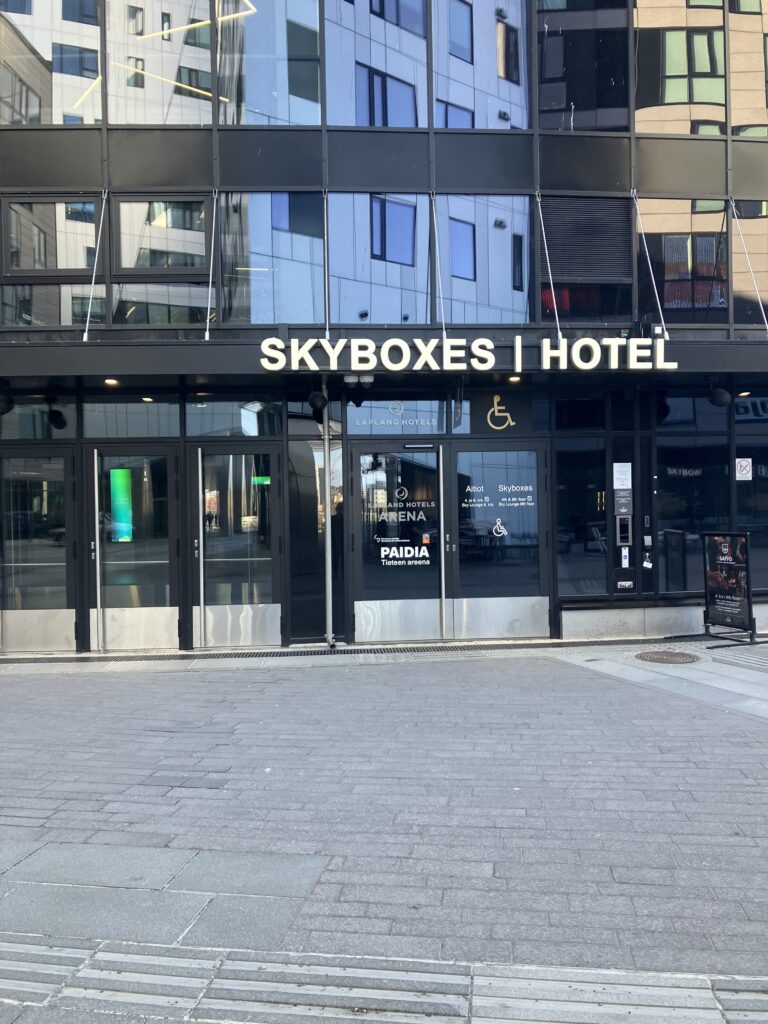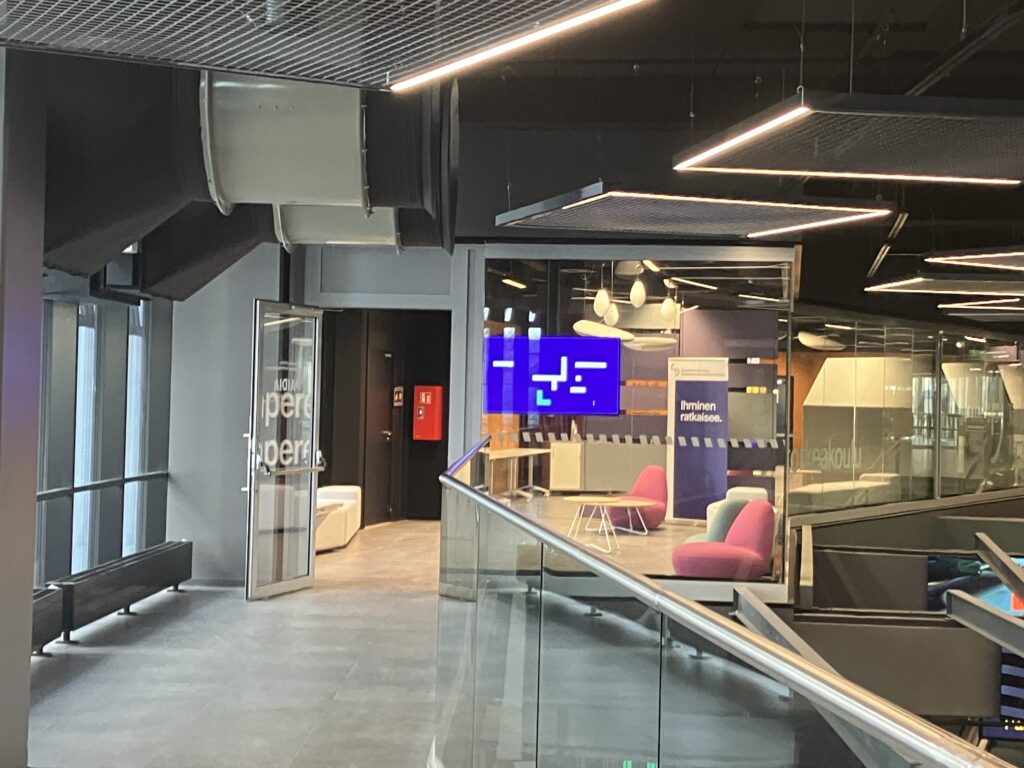
April 9th and 10th, Tampere University, Hybrid event in Paidia Space (Tampere, Finland) and online. Registration is Now Open (for presenters and in person attendees). All are welcome to attend the conference online free of charge here: Zoom Link. Discord Link.
Guide to getting to Paidia Space:
- It is located at Tampere Arena (Kansikatu 3, 33100 Tampere)

Step 2: Find the Door that says “Paidia” On it:

Step 3: Go to the elevators (that are on the right) and go to the 3rd floor.
Step 4: Go left down the hallway and get to Paidia Space:

Program:
Wednesday April 9th 2025
9:45 Welcome Comments
10:00-11:00 Keynote 1 Simo Järvelä
Session 1- Theoretical Foundations of Role-Play (11:00-13:00)
- The Geneology of Role-Playing (Mátyás Hartyándi)
- The Meaning of Role-Play in Personality Development (Daniil Kovalenko)
- How Do You Want To Do This?: Us, Roleplaying Games & The End of the World (Șerban Mark Pop)
- The Extended Subject: Philosophical Reflections on the Dual Body in RPGs (Jiaiyi Wang)
Lunch Break 13-14
Session 2- Styles and Experiences of Role-Play (14-15:30)
- Hack, slash, heal, repeat: Theorizing the concept of the murderhobo in tabletop role playing games (Steven Dashiell)
- How is learning in edu-larp as a method described and seen by practitioners? (Josefin Westborg)
- Losing and Finding Oneself_ Superrealism and the Question of the Character in RPGs (Sarah Lynne Bowman, Lauri Lukka, Josephine Baird
Discussion- 15:30-17
Screening of Hero Camp! At Paidia Space in Tampere University (19:00-20:30) Discussion/Comments with the Filmmaker Sam Ho (20:30)
Thursday April 10th
9:45 Welcome Comments
10:00-11:00 Keynote 2 Felipe Garcia-Soriano
Session 3- Role-Play Across Culture (11-12:30)
- Another Kind of Future/Past: Decolonial and Asiafuturist Imagination in the Philippines from the 19th Century to the Contemporary Tabletop Role-Playing Games of #rpgsea (Adrian Hermann)
- The Playfulness of Drag: Crossplay in The Philippines and its Role in Reclaiming the Artistry of Drag (Rika Paderes)
- Jubensha: The Rise and Adaptation of Live-Action Role-Playing Games in China (Pengze Zheng)
Lunch Break (12:30-13:30)
Session 4- Extended Abstracts (13:30-15:00)
- Catfishing to get a PHB: chicha culture and the development of the Peruvian TTRPG community (Maria Jose Espinosa Chueca)
- The Metaplot Paper: An Extended Abstract (Jukka Särkijärvi)
- The Role of the Cosmographer: Role-Playing Games as Technologies for Exploring Possible Worlds (Nicholas Mizer)
Discussion and Concluding remarks (15:00-16:00)
Friday April 11th (After-Event)
16:30, Paja Workshop Space Vapriikki Museum and on Zoom.
Role-Play and Games Research Talk is a public-event to show how role-playing and storytelling occurs in games in multiple media: digital, live action, and table-top. Three experts from a diversity of fields and cultural backgrounds will unpack the topic for a public audience in Tampere. This 90-minute research talk will occur in Vapriikki’s Paja Workshop space and online via zoom. Three speakers will present-
Anastasia Kuznetsova is an experienced Narrative Designer/Screenwriter Specialist. She is also an active Nordic Larp Designer and her talk will explore the nature of role-playing and storytelling in her design practice.
Felipe García-Soriano is a sociologist currently pursuing a PhD in Economy, Business, and Society at the University of Alicante in Spain. Felipe’s talk will introduce the Dynamic Loop Model, a framework developed to better understand the unique dynamics of Tabletop Role-Playing Games (TRPGs).
Christopher Wiley is the Executive Director and Camp Director of the Story School in Boston USA, which empowers and transforms youth through educational live-action role-playing games (eduLARPs). He will be giving a talk on how they approach character and role-playing as a tool for personal growth.
This after-event will be In Person Paja Workshop Space Vapriikki Museum and on Zoom–
Time: Friday Apr 11, 2025 04:30 PM Helsinki
Call For Papers:
What are the roots of role-playing? This conference opens up a space for scholars to come together to discuss the foundations of role-playing in a game: Historical, Cultural, Theoretical, and Critical.
Historically, it is common to describe a shared history where Lord of the Rings and Wargaming came together to create a fantasy combat game genre typified by titles such as Chainmail and Advanced Dungeons and Dragons. However, several elements of role-playing in games, including interactive theater, role “taking” in psychological drama, historical re-enactments, costume parties, and imagination play, have long histories of documentations and as a part of human society. We invite alternative historical trajectories of other critical lines, events or ideas that came together to form role-playing in games as we know it.
Culturally, role-playing in games has a notably Western-focus in its past literature. We invite papers, research works that target alternative cultural histories, foundations and works that incorporate or fill in theories of role-playing. We invite alternative foundations across culture, drawing from performance studies, interactive dance, trance, and Līla. In addition, we invite analyses of role-playing focusing on diverse aspects of games and players, including the social roles, structure and activities of player communities, and the political economy of role-playing games.
Theoretically, there is a lack of work on why, how, or in what way role playing in games manifest. There is a long history of theory-building within role-player studies done by role-players themselves. We invite foundational approaches to role-playing, whether psychological, sociological or more game design-oriented. This may include overarching theories of role-playing but also theory building-focused analyses of specific role-playing games and formats.
Critically, we invite papers that challenge norms of what is “role-playing” in games at all. Whether it is foundational theories taken for granted that should face greater scrutiny, or “edge-case” scenarios of role-playing in games that are actually very widespread and deserve discussion, this invites those critical approaches. Examples: queer theory and role-playing, sports philosophy, professional wrestling/performative role-play, dark role-play, technologically enhanced role-play, serious role-play, pervasive role-play.
Submission Process
Articles should be 4000-6000 words with references formatted in any accepted citation style. All submissions and any questions can be sent to info [at] gamesasartcenter [dot] com with the title “Role-Play in Games Conference”.
Authors are also allowed to submit a “work in progress” abstract of 500-1000 words for the conference.
Authors will submit full articles by the submission day. Conference organizers will select attendees to the conference through a non-anonymous selection process. After authors are chosen, each will be given 2 other articles to review before the conference. These reviews should be submitted one week before the conference. On the conference day, presenters will have 10 minutes to present their work and each reviewer will have 5 minutes to provide a response, in addition to their written comments. Then, there will be a 10-minute discussion with the audience. In addition, conference texts will be made available to other attendees for comments.
This conference will be free for all attendees and hybrid. Submissions will be asked to mark whether they are likely to attend in person, or online. There is no requirement for any accepted authors to attend in person.
After the conference, based on peer-reviews, select participants will be invited to submit for a special issue on the topic, possibly with the International Journal of Role-Playing.
Article submission date: January 15th 2025 (Anywhere on Earth) January 29th
Acceptance notification date: January 29th 2025 February 12th
Peer-reviews submitted: April 2nd 2025
Conference days: April 9th and 10th 2025
Keynote Speakers: Simo Järvelä (Senior Scholar Presenter) and Felipe Garcia Soriano (Junior Scholar Presenter)
Organized in collaboration between the Tampere University Game Research Lab (https://gameresearchlab.tuni.fi/), The Games As Art Center, Leland Masek, Daniel Fernández Galeote, Antonio Pomposini, Ian Sturrock, Jaakko Stenros, Sarah Lynne Bowman, Felipe Garcia Soriano.
Updates:
On the first night of the conference we will be hosting a European debut of Hero Camp! This is a documentary film by Sam Ho about one of the oldest Edu-larp programs in the united states. It describes itself as a coming-of-age documentary that follows three queer teens on their paths towards self-discovery at a live action role-play summer camp. Set against the backdrop of suburban Massachusetts, the film captures how this extraordinary camp community transforms our world into the fantasy realm of Sidleterra, where they battle villains from the writings of Homer and Lewis Carroll. As each of them invent and role play as their camp characters, they unearth revelations about their own identities, which they gradually carry over to the real world.

Simo Järvelä
Simo Järvelä, PhD is a cognitive scientist and currently a postdoctoral researcher at the Gamification Group in Tampere University. He has a wide-ranging research career revolving around affective processes in human-technology interaction – including games, gamification, and play – but also with forays into e.g. political morals, neuroeconomics, and conflict dynamics. As a life-long roleplayer and larp designer, he is keen to apply scholarly understanding to the art form and to combine theoretical thinking and pragmatic design. Over the years he has published multiple articles on roleplaying related topics and is a regular presenter in conventions and conferences.
KEYNOTE SUMMARY
Recent advances in cognitive sciences present a view of the human cognition as thoroughly embodied prediction apparatus embedded in and extended to the landscape of affordances surrounding us. This principled theoretical approach can cover such central elements of roleplaying as play, fiction, narratives and characters, psychological phenomena as immersion and bleed, social dynamics of the magic circle, and higher socially constructed levels of gaming culture. The keynote will cover the core ideas of this theoretical perspective and how those can be applied to understanding roleplaying in games. The keynote will also attempt to position this view in current multidisciplinary game studies and various methodologies used in it.
Felipe Garcia Soriano
Our Junior Scholar Keynote is-
Felipe García-Soriano is a sociologist currently pursuing a PhD in Economy, Business, and Society at the University of Alicante. He holds a Master’s degree in Social Innovation and has dedicated his career to exploring the intersections between game design, non-formal education, and social projects. With experience in both local and international contexts, Felipe has participated in initiatives like Erasmus training programs and the European Students’ Assembly. His work focuses on designing meaningful learning experiences and fostering connections between theory and practice.
KEYNOTE SUMMARY:
Felipe’s keynote introduces the Dynamic Loop Model, a framework developed to better understand the unique dynamics of Tabletop Role-Playing Games (TRPGs). Using concepts from Stafford Beer’s Viable System Model and Niklas Luhmann’s Social Systems Theory, the presentation examines how TRPGs function as self-regulating systems, adapting to players’ actions through constant feedback. The talk highlights how this model connects game dynamics, offering new perspectives for designers and researchers interested in creating engaging and adaptive game systems. The keynote aims to open a conversation about the potential of systems thinking in Game Studies.
